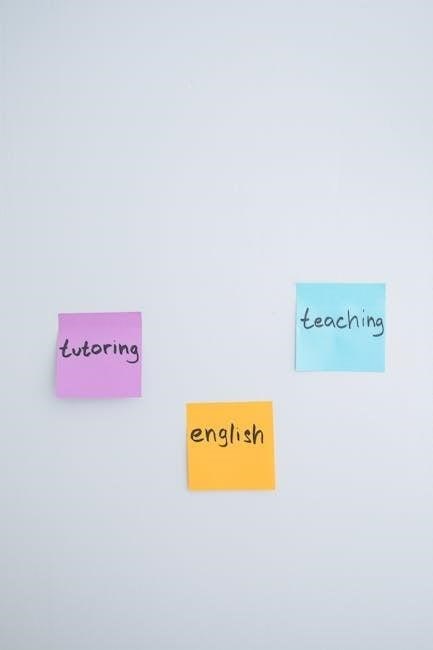The Bedford Guide for Writing Tutors is a comprehensive resource offering tutoring strategies and best practices․ It covers principles, techniques, and advice for tutors of all levels, helping them refine their methods while reflecting on their approach․ The guide emphasizes active listening, guiding the writing process, and fostering independence, making it essential for effective tutoring and student success․
1․1 Overview of the Bedford Guide
The Bedford Guide for Writing Tutors provides a concise and practical introduction to tutoring, offering strategies and techniques for supporting writers․ It covers essential principles, active listening, and fostering independence․ The guide emphasizes building strong tutor-student relationships and guiding writers through the writing process․ It is designed for tutors of all levels, helping them refine their methods and enhance student success․
1․2 Purpose and Scope of the Guide
The Bedford Guide for Writing Tutors aims to equip tutors with practical tools and insights to effectively support writers․ Its scope includes strategies for active listening, guiding the writing process, and fostering independence․ The guide addresses diverse tutoring scenarios, ensuring tutors can adapt methods to meet individual student needs, ultimately enhancing learning outcomes and tutoring experiences․

The Role of a Writing Tutor
A writing tutor serves as a guide, supporting students in understanding writing processes and improving their skills․ Tutors foster independence, clarity, and confidence in writers of all levels․
2․1 Understanding the Tutor’s Responsibilities
A tutor’s primary responsibility is to assist students in developing their writing skills through active engagement․ This involves fostering critical thinking, encouraging self-editing, and providing constructive feedback․ Tutors act as facilitators, helping students navigate the writing process while respecting their unique voice and style․ Building trust and rapport is crucial, ensuring students feel supported in their academic journeys․ Effective communication and empathy are key․
2․2 Building a Tutor-Student Relationship
Building a strong tutor-student relationship is foundational for effective tutoring․ It involves creating a comfortable, non-judgmental space where students feel heard and supported․ Empathy, understanding, and mutual respect foster trust, enabling students to share their writing challenges openly․ By focusing on collaboration and student-centered dialogue, tutors help students gain confidence and independence in their writing journey․

Strategies for Effective Tutoring
Strategies for effective tutoring include practical approaches to engage writers actively, foster independence, and provide tailored support through collaboration and clear communication․
3․1 Active Listening and Questioning Techniques
Active listening and questioning techniques are essential for understanding writers’ intents and challenges․ By attentively listening, tutors can identify key issues and ask open-ended questions to encourage critical thinking․ This approach fosters a collaborative environment, helping writers clarify ideas and develop their voice․ Effective questioning guides writers through reflection and revision, enhancing their ability to express thoughts clearly and coherently in their work․
3․2 Guiding Writers Through the Writing Process
Tutors play a crucial role in guiding writers through brainstorming, drafting, revising, and editing․ By asking targeted questions and offering constructive feedback, they help writers clarify ideas and strengthen arguments․ Tutors also encourage writers to explore different writing strategies, fostering creativity and critical thinking․ This collaborative approach empowers writers to take ownership of their work and develop confidence in their writing abilities over time․

Addressing Common Writing Challenges
Writers often face obstacles like writer’s block, unclear ideas, and coherence issues․ Tutors help identify these challenges and provide strategies to overcome them, enhancing writing quality and confidence․
4․1 Helping Writers Overcome Writer’s Block
Writer’s block often stems from fear, lack of ideas, or perfectionism․ Tutors can help by encouraging brainstorming, freewriting, or outlining․ Active listening and supportive feedback can build confidence․ Breaking tasks into smaller steps and setting realistic goals also helps․ Creating a non-judgmental environment allows writers to express ideas freely, fostering creativity and progress․ Patience and empathy are key in guiding writers past this common hurdle․
4․2 Strategies for Improving Clarity and Coherence
Tutors can enhance clarity by guiding writers to use precise language and logical structure․ Encourage breaking down complex ideas into simpler ones and organizing thoughts with clear transitions․ Active listening and questioning help identify ambiguities․ Promoting self-editing habits and the use of examples can further refine clarity․ Modeling effective writing techniques and providing constructive feedback also supports coherence and overall writing quality․

Fostering Independent Writing Skills
The Bedford Guide emphasizes helping writers become self-sufficient․ Tutors encourage self-editing, promote critical thinking, and build confidence, enabling students to approach writing independently with improved skills and clarity․
5․1 Encouraging Self-Editing and Revision
The Bedford Guide highlights the importance of self-editing and revision in fostering independence․ Tutors can teach students to review their work critically, identify areas needing improvement, and implement revisions effectively․ This process helps students develop a keen eye for detail, understand the value of multiple drafts, and cultivate a habit of refining their writing without reliance on others․ Over time, this practice builds confidence and enhances overall writing quality significantly, making self-editing a cornerstone of independent writing skills․
5․2 Teaching Students to Provide and Receive Feedback
Tutors play a vital role in teaching students to give and receive feedback effectively․ By modeling constructive criticism and encouraging open dialogue, tutors help students learn to articulate their thoughts clearly and listen respectfully․ This fosters a collaborative environment where students feel comfortable sharing their work and applying others’ insights to improve․ Regular feedback exchanges enhance writing quality and reinforce the value of peer review in the learning process․

Cultural and Language Diversity in Tutoring
Understanding and respecting cultural backgrounds and language diversity is crucial in tutoring․ Tutors must adapt strategies to meet the unique needs of multilingual and multicultural students․
6․1 Supporting Multilingual Writers
Supporting multilingual writers requires understanding their cultural and linguistic backgrounds․ Tutors should adapt their communication strategies to meet diverse needs, using clear examples and patient guidance․ Recognizing language barriers, tutors can help bridge gaps by fostering confidence and encouraging writers to express ideas effectively, while respecting their unique voice and background․
6․2 Addressing Cultural Differences in Writing Styles
Cultural differences in writing styles require tutors to be sensitive to diverse traditions․ Tutors should adapt their feedback to accommodate varying structures, tones, and argumentation approaches․ By recognizing these differences, tutors can provide more effective support, helping multilingual writers express ideas clearly while respecting their cultural influences and fostering an inclusive tutoring environment․
Professional Development for Tutors
Professional development for tutors involves continuous learning, collaboration, and staying updated with best practices to enhance tutoring effectiveness and adapt to evolving educational needs․
7․1 Continuous Learning and Growth
Continuous learning and growth are essential for tutors to stay effective․ Tutors should engage in ongoing education, workshops, and self-reflection to refine their skills; Staying updated on educational trends, writing strategies, and technologies ensures they can adapt to diverse student needs․ By expanding their knowledge and practices, tutors enhance their ability to support writers effectively, fostering improved learning outcomes and personal professional development․
7․2 Collaborating with Other Tutors and Instructors
Collaboration with other tutors and instructors fosters a supportive learning environment․ Sharing strategies, resources, and experiences ensures consistent guidance for students․ Regular communication and teamwork enable tutors to align their approaches with classroom objectives, addressing student needs holistically․ This collective effort enhances tutoring effectiveness and promotes a unified understanding of writing development across educational settings․

Tools and Resources for Writing Tutors
Effective tutoring relies on utilizing the right tools and resources, such as writing software, online platforms, and educational materials, to enhance student learning and improve writing outcomes․
8․1 Recommended Materials and Technologies
The Bedford Guide highlights essential materials like grammar guides, style manuals, and online tools such as plagiarism checkers and interactive writing platforms․ These technologies are chosen to enhance learning and streamline the tutoring process, ensuring tutors can address diverse student needs effectively while maintaining academic integrity and promoting engaging, tech-savvy instruction․
8․2 Utilizing Online Resources for Tutoring
The Bedford Guide emphasizes leveraging online resources to enhance tutoring effectiveness․ Tools like interactive writing platforms, grammar checkers, and plagiarism detectors provide immediate feedback, fostering student improvement․ Tutors can access online tutorials, writing guides, and collaborative tools to engage students remotely․ These resources promote flexibility, accessibility, and personalized learning, ensuring tutors can address diverse needs and facilitate meaningful progress in students’ writing skills․
The Bedford Guide for Writing Tutors concludes by reflecting on tutoring experiences and exploring future advancements in writing instruction․ It emphasizes adaptability and continuous improvement․
9․1 Reflecting on Tutoring Experiences
Reflecting on tutoring experiences is crucial for growth․ It allows tutors to identify strengths, address challenges, and refine techniques․ By evaluating past sessions, tutors can adapt strategies to better support diverse writers․ Continuous reflection fosters self-awareness and improves tutoring effectiveness, ensuring meaningful learning experiences for students․ This practice also encourages tutors to stay attuned to evolving writing pedagogies and student needs, enhancing overall program success․
9․2 Advancing the Field of Writing Tutoring
Advancing the field of writing tutoring involves embracing innovation and collaboration․ By integrating technology, such as AI tools and online platforms, tutors can enhance accessibility and engagement․ Sharing best practices through publications like The Writing Center Journal fosters professional growth․ Encouraging research and dialogue among tutors and educators drives continuous improvement․ This collective effort ensures tutoring evolves to meet diverse student needs and remains a vital support for writers of all levels․